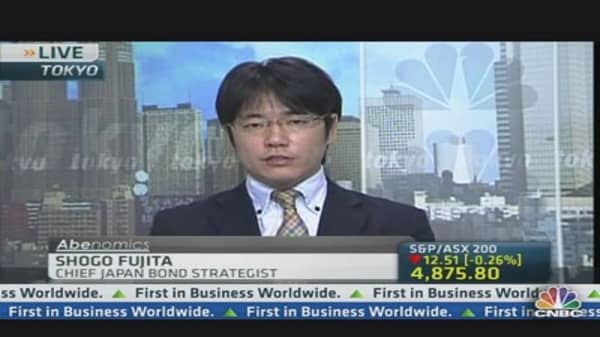Further underpinning gains was anticipation ahead of Prime Minister Shinzo Abe's announcement of the widely awaited 'third arrow' in his 'three arrow' strategy to turn around Japan's economy. The measures include the creation of special economic zones to help support growth.
The index's recent sell-off has some experts saying the index could be in the grips of a "June swoon" as it approaches bear market territory. A bear market is defined as a downturn of 20 percent or more below a record closing high.
The index has now lost 13 percent from its five-and-a-half-year peak of 15,627 on May 22. If the index falls below 12,500, it will enter a bear market.
(Read More: Relax, Sign Points to Eventual Rally in Japan Stocks)
"This interim period of volatility is to be expected in a big shift – The same happened to with the Federal Reserve and that's what the BOJ is going through now and I think it will eventually pull through," said Shogo Fujita, chief Japan bond strategist at Bank of America Merrill Lynch.
RBA Lifts Australia
Australia's benchmark index moved off a four-month low to approach the 4,990 mark after the Reserve Bank of Australia (RBA) maintained its easing bias at a policy review, after leaving its benchmark interest rate unchanged at 2.75 percent.
The central bank eased policy last month by slashing rates to a record low of 2.75 percent and most analysts were not expecting another cut. However, the recent rebound in the Australian dollar had kept some experts on the fence. The currency rallied to a near two-week high against the greenback, jumping to $0.9720, well above last week's low of $0.9528.
"The rates and AUD outlook are intertwined. If the AUD remains well off its peaks, as we are forecasting, the RBA may not need to cut rates further to support growth," said Paul Bloxham, chief economist, Australia and New Zealand, HSBC in a note.
Shares of surf-wear retailer Billabong plummeted 49 percent after stating that it has ended takeover talks with two potential suitors and downgraded its full-year profit guidance.




